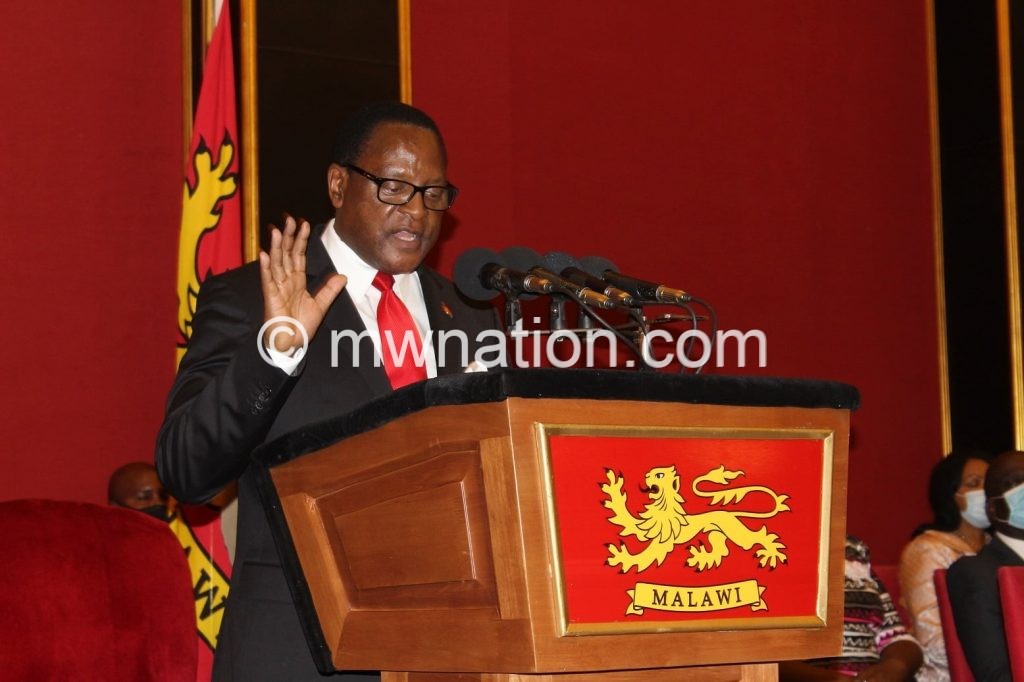Chakwera’s mild second coming
President Lazarus Chakwera yesterday fulfilled his second date with legislators in a mild encounter and pledged to implement the Tonse Alliance’s mouthwatering campaign promises that won him 58.9 percent approval from voters last June.
Responding to a question from Nkhotakota North East member of Parliament (MP) Martha Lunji Mhone Chanjo (Democratic Progressive Party-DPP) on when Malawians should expect the commencement
of campaign promises such as duty-free week and reduction of passport fees to K14 000, the President said the promises would be fulfilled after consolidating the agenda of the two major players in the alliance—his Malawi Congress Party (MCP) and UTM Party of Vice-President Saulos Chilima.
He said the combined effect of the consolidation exercise and Covid-19 pandemic have slowed down implementation of the promises, but assured the promises will be fulfilled.
“But I can promise you, I can promise the people of Nkhotakota North East and I can promise Malawians, these promises will be fulfilled,” said Chakwera, who donned a black business suit white shirt and a red neck-tie.

The President said MCP and UTM Party, which provided presidential candidate and running mate in the court-sanctioned fresh presidential election held on June 23 2020, consolidated their manifestos and that some of the pledges the two parties made separately, especially in the run up to the annulled May 21 2019 Presidential Election will still be implemented after harmonisation.
He said when the two parties run for office separately, their manifestos had promises such as universal fertiliser subsidy, subjecting Cabinet ministers to performance contracts, making governance institutions such as the Anti-Corruption Bureau, National Audit Office and the Financial Intelligence Authority independent and making operational the Access to Information Act.
The President also said the manifestos promised job creation, promotion of large-scale farming through mechanisation, development of road and rail infrastructure through ambitious projects and boosting economic activity through value-addition, among others.
However, several pledges were not shared by the eventual partners These included increasing the minimum wage to K50 000, raising the zero-rated tax bracket of Pay As You Earn tax from K35 000 to K100 000 and changing the fiscal year from July 1 to June 30 cycle to April 1 to March 31 cycle which MCP championed.
On the other hand, the UTM manifesto included introduction of duty-free week, reducing the cost of passports and removing electricity connection fees.
In his response, the President added: “Upon assuming office, we have been consulting among
ourselves and engaging various MDAs [ministries, departments and agencies] on the best approach and timeline for implementing the promises that are unique to each manifesto.”
But this response did not pacify the opposition and attracted follow up questions, including from Chanjo who questioned the President whether his remarks meant the two partners never consulted technocrats before campaigning on them.
In response, the President said some of the promises, notably the pledge to reduce passport fees, was derailed by the contractual agreement the DPP administration signed with the supplier of passport books.
He said the Vice-President has been tasked to look into how similar contracts were framed in a manner that defrauded the country.
Five questions were lined up for the President, but Leader of Opposition in Parliament Kondwani Nankhumwa was conspicuously missing on the list.
Save for Mulanje South West MP and former Cabinet minister George Chaponda, whose supplementary question on alleged police training of 75 MCP youths was objected by Speaker of Parliament Catherine Gotani Hara after being prompted by Leader of the House Richard Chimwendo Banda, the DPP top leadership remained seated.
In general, Chakwera came out of Parliament unscathed on his second coming, raising the question why his predecessors— except Bakili Muluzi—seemed to dread the democratic process.
Besides the two President’s Questions Time series, he also availed himself in Parliament to respond to lawmakers on issues raised in his maiden State of the Nation Address delivered on September 4 2020.
Section 89(3)(c) of the Constitution provides that “the President shall each year, immediately before the consideration of the official budget, attend Parliament and shall: ( c) respond to questions”.





